Letters from Arrakis
Part 3: in which we discuss, well, Book Three.
Hello,
If you’re new here, four of us have been rereading Frank Herbert’s Dune and discussing the book/films in a series of letters (spoiler: not all of us like it). If you’re interested, the previous letters are here (hosted by Vanessa) and here (hosted by Claudia).
Welcome to our third and penultimate Letter from Arrakis. It arrives dusty, the sand of aeons sprinkled across the seal. But before we break that wax and unfurl the pages, let’s recap what occurred in Book Three.
P.S. this post is quite long because it has many pictures! Your email may clip the post, so it’s best to view it on the website by clicking the title above. This piece took a fair bit of work to compile, so our advanced thanks to you, lovely reader, for reading!
Book Three synopsis
Feyd-Rautha discovers that Hawat has manipulated him and played him against the baron. Jessica gives birth to Alia, and Chani has a son named Leto with Paul. The Fremen are wary of Alia, who speaks fluently at just two years old. A messenger informs Jessica about a plan to push Paul into challenging Stilgar for tribal leadership.
During a smuggling interception, the Fremen find Paul's old teacher Halleck leading the operation. Halleck renews his loyalty to Paul, who convinces the Fremen to accept him as duke and prepare for a fierce battle. After a spice-induced coma, Paul awakens and speaks of the ancient forces only he can balance.
Stilgar and Paul plan to strike the baron and his legion during a sandstorm, but news of Leto's death and Alia's capture interrupts. As the emperor threatens Paul, the Fremen attack, resulting in Alia killing the baron. Paul negotiates with the emperor, defeats Feyd-Rautha in a duel, and secures the throne through marriage to Princess Irulan, the emperor's daughter. Although Irulan will be the "royal concubine," Paul reassures Chani that she is his true wife.
So, what did we think of Book Three?
Nathan: Well it ends flat, that’s for sure.
Claudia: Nathan, in the comments of the last letter you said that you were confused by the timeline… though there were clues in the first chapter. Pay more attention next time!
(everyone laughing)
Nathan: Yeah, so I went back and saw I had actually underlined the baron saying, “I remember a time in the arena several years ago.” Like much of Dune, Book Three was soporific.
Alexander: Soporific is too elaborate a word to describe the blunt prose and its sleep-inducing effects. I fell asleep many times trying to finish this abhorrently boring drag of words. It has its moments where I did not fall asleep, or, to put it into Herbert’s words, succumbed to the fatigue despite those nifty anti-fatigue pills mentioned countless times. Come to think of it, all his characters are constantly tired.
Vanessa: That sand gets into the eyes, after all. My reading experience was more or less the same. Book Three should have been exciting but most of it dragged on quite a bit.
Nathan: Don’t forget the many dry throats. Yes, like you, I’m going to grumble again. Book Three was bleh. There’s some points of interest, key plot progressions, a greater focus on the antagonists… but I just can’t get past the exposition dumps. There was enough of this in the epigraphs, like this one:
And it came to pass in the third year of the Desert War that Paul-Muad’Dib lay alone in the Cave of Birds beneath the kiswa hangings of an inner cell. As he lay as one dead, caught up in the revelation of the Water of Life, his being translated beyond the boundaries of time by the poison that gives life.
Alexander: Confession time: I skipped most epigraphs. They are essentially spoilers. We are told about Muad’Dib, the Emperor, Alia and even Yueh’s betrayal. Everything is spelled out for us, I can do without that, thanks Irulan. More like Idontrulan. Now, you could argue, we gain “prescient knowledge” akin to Paul’s experience, knowing what will happen without being able to change any of it.
Nathan: Haha, Idontrulan. Love that. Actually, the epigraphs I didn’t mind so much, because it was a way for Frank’s exposition to have a more realistic place. The things I skipped were Halleck’s songs. (not a fan of songs in any book, to be honest.) I did chuckle at the concluding paragraph of the book, where it’s noted that Irulan “has pretensions of a literary nature”. My scrawled note alongside that was a YES, WE KNOW!
Claudia: At least Paul gets to kick the emperor’s ass at the end of Book Three. I enjoyed that!
Alexander: Yeah, he gets to hang out with his Sardaukar buddies now on Salusa Secundus! Lots of water there and other fun stuff to do, like hanging upside down in the rain…
‘An Atreides promised it. Muad’Dib, however, sentences you to your prison planet. But have no fear, Majesty. I will ease the harshness of the place with all the powers at my disposal. It shall become a garden world, full of gentle things.’
Nathan: So, yes, it was Alia who killed the baron, and then Paul becomes the emperor. But is he a hero?
Is Paul a hero or an anti-hero?
Alexander: Is Paul Atreides the destined hero of Arrakis, or does he follow a darker path, that of the antihero? The line between heroism and moral complexity blurs as Paul grapples with power, prophecy, and the intricate dance of political intrigue. His preordained journey leaves us pondering whether he is the saviour foretold or merely attempting to navigate the murky waters of destiny. Hero or antihero, as the shifting sands on Dune change in their timeless tide, so does Paul. What does his future hold?
Nathan: Almost sounds like you enjoyed it, Alexander.
Alexander: One can enjoy the ideas.
Claudia: Hmm, not sure what his future as a leader holds. But up to the point where he defeated the emperor, I always saw Paul as the underdog because he is only 15, he was manipulated into existence by the Bene Gesserit and his mother, and has very little freedom in determining his own destiny. From the outside it seems like life gave him everything—born as the son of a rich leader, genetically engineered to become the Kwisatz Haderach, destined to be loved and followed by others—but the path laid out for him leads to a terrible ending and he has no power to change anything.
Alexander: Characters in Dune often operate in shades of gray, making it challenging to categorize them strictly as heroes or villains.
Nathan: That’s certainly no bad thing.
Vanessa: It is fascinating how Herbert starts out with the Harkonnens and Piter as obviously, stereotypically evil (complete with icky sexual preferences and the evil laugh) but then adds more and more nuance over the course of the story: First, we find out that Jessica and Paul are related to them, then Dr. Yueh enters as a tragic villain/victim figure, and finally Baron Harkonnen is thrown to the wolves (into conflict with the Fremen on Arrakis) by Emperor Shaddam IV and Count Fenring, resulting in his demise. Herbert gradually goes from black and white to shades of gray, as if telling us, the readers: Grow up! Nothing is ever black and white.
Nathan: I guess you could say that Paul has a character arc. He goes from penciled hero to a sort of arrogant oh-but-I-must-prevent-this-jihad-but-I’ll-do-everything-I-can-to-make-it-actually-happen moody teenager. That said, Paul as Fremen made for far more interesting dialogue:
‘I would go south, Stilgar – twenty thumpers. I would see this land we make, this land that I’ve only seen through the eyes of others.’
Alexander: Is Chani the real hero?
Nathan: She’s my hero. (By the way, Euphoria? Incredible. <3 Zendaya.)
Alexander: Chani, O Chani, thou art a fierce warrior, the love of Paul Atreides, and the beating heart of Arrakis.
Nathan: What about Liet?
Alexander: He, err, She ded.
Claudia: Dead means they can’t be a hero.
Nathan: Really? The “fallen hero.” That’s a thing in literature, no?
Alexander: Only a dead hero is a good hero? Why, of course! And a dead villain is…
Vanessa: A good villain?
Alexander: Heroes and villains, sides of the same coin. What other villains do we have?
Yes, we’ve barely spoken of all the antagonists of Dune, but in Book Three they feature heavily. Is there one main villain?
Nathan: The Baron is cast as the obvious villain, of course. But there are others.
Claudia: I find everything about Vladimir fascinatingly repulsive…
Nathan: Yeah, he’s the most out-there character in the book. And films. I like that, despite the ickiness. His dialogue, though? The worst in the entire book.
Alexander: One must again thank Denis for adapting his dialogue to mostly one-liners, which are in line with his capacity for villainous villainy.
Vanessa: Who is the main villain then? Is there even one?
Claudia: This is a hard one. As you already mentioned, Dune's characters are complex and, just like in real life, they are not uniquely evil or good. Except, maybe, for Vladimir Harkonen. But he’s not the smartest cookie so I wouldn’t consider him the ultimate villain.
Alexander pondering: What is a villain? (*Checks*) According to the Oxford Dictionary, a villain is:
the character in a play, novel, etc., whose evil motives or actions form an important element in the plot.
Claudia: There’s Piter who is evil only because the Baron turned him into an addict and twisted his mind. Feyd-Rautha who is more of a rich teenage prick who likes to torture slaves. The Emperor is worth mentioning because he has a planet on which he tortures men to turn them into fighting machines for his own benefit. But he is too self-involved to make a great villain. It has to be someone from either the Bene Gesserit or the Guild, as these two castes are the most fascinating and conniving. They hold the most power and influence, and they have their own twisted vision of the future. Ultimately, I think the Bene Gesserit are my favourite: I give them a 10 out of 10.
Voice from off screen: Are we saying that Bene Gesserit are the villain, then? Is their goal any clearer?
Nathan: I’m not sure we’re any closer to when we spoke about them in our first letter.
Frank: Since the Bene Gesserit want to control the universe, it stands to reason that they are the ultimate evil. Besides, my eight aunts wanted to force Catholicism on me, so, yes.

Vanessa: I think we can agree that the villain must have agency that is perceived as EVIL by the audience. Take Baron Harkonnen: Destroy House Atreides? Check. Control Arrakis? Check.
Alexander: Paul is half Harkonnen, and Jessica is the Baron’s daughter. Does that make them evil by proxy?
Claudia: The sins of the father…
Nathan: It makes them human, at least.
Alexander: Right. And then there are the henchmen, the psychopaths, the sadists, the broken, the insane. Like Rabban the Beast, a tool wielded by the Baron, just like the Sardaukar do the Emperor’s bidding. Are they all evil?

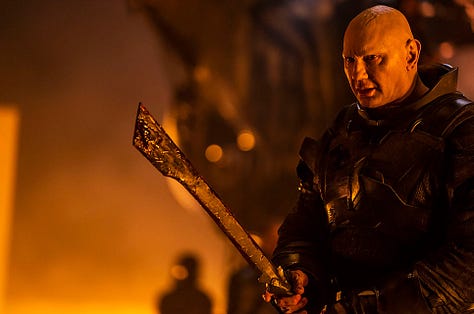
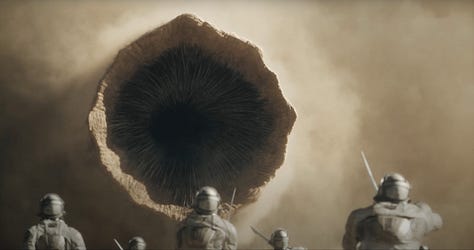
Nathan: They all have one thing in common by the end of the book.
Vanessa: They are pushing up daisies.
Alexander: Hey, there’s a great show by that name (minus up)… never mind. And then there’s pouty lips Feyd-Rautha, bred to sire the next Kwisaz Haderach, turned into a narcissistic, scheming, remorseless killer. Is he another victim of the Bene Gesserit? Luckily, they salvage his genetic material by seducing him before he joins the Choir Invisible. Can’t let those good evil genes go to waste!
Nathan: Huh. I don’t remember that.
Alexander: Come to Arrakis. Maybe Arrakis is the villain, the drug dealer. Get your Spice fix. Sentient planets are a thing in SF. Not in Dune, though. But… what if?
Claudia: Now that’s a fascinating thought, Alexander. What if Shai-Hulud’s ultimate goal is to conquer the universe and turn it into a wormverse?
Nathan: This would require an entire letter to answer! Count me out.
*Nathan laughs. No-one else laughs.*
What works and what doesn’t work in Dune?
Alexander: Dune weaves a complex tapestry of triumphs and pitfalls. The world-building and political intrigue draws readers into a mesmerizing universe. Yet, the narrative's convolution and dense exposition pose challenges, leaving some readers yearning for a more accessible storyline. Dune's success lies in its ability to transport audiences to an unparalleled realm, but its intricate web of concepts may test the limits of reader engagement.
Nathan: I agree. I’ve known many people who have started the book but never finished it, but it’s worked for enough over time given its success and legacy. That likely comes down to the draw of Arrakis, a planet that is both alien yet familiar. We see, especially now, the future of our Earth in Dune. (Sans worms.) The specific appeal of the book may have changed over the years, but with the release of Denis Villeneuve’s films, it seems unlikely to waver. Despite all that, I remain baffled from a literary perspective. It’s not a great book. The writing is, in my small opinion, shite.
Alexander: Indeed, the prose sucketh. As Terry Pratchett put it, he wouldn’t hire Asimov (or Herbert) to “write junk mail”1 , and Tolkien “disliked Dune with some intensity”2, but it survived all the critics and Dune lives on in the hearts and minds of countless (well, you could count them I suppose but they are legion) and as such has found its way into the hall of fame of Science Fiction. The ideas, it’s all about the ideas!
Nathan: Yes, I think you’re right: the ideas keep it alive.
Vanessa: I agree, and Dune is not alone in that. Many other classics have withstood the test of time, not thanks to their prose but despite of it. (Although I personally wouldn't count Lord of the Rings as one of those.)
Claudia: For me it’s the themes, worldbuilding and characters. It was fascinating discussing the heroes and villains of Dune with you all, which made me realise how complete they are as characters, how human they are in their villainous or heroic pursuits, how fragile and prone to error, both attractive and repulsive in their greed, pain, ambition, selfishness, and most secret desires. I think that one of the issues with current day storytelling for high concept stories, like Sci-Fi, is how formulaic it is, how one-sided and caricature-like characters are: heroes and villains, sidekicks and mentors, the guy who dies mid-action, hanging on one finger above a cliff.
Nathan: Yeah I have low tolerance for such books and films.
Claudia: The themes are very timeless: the social class engineering through curation of genetic material, religious manipulation, a rigid class structure with assigned functions and built-in mental and physical limitations for what each individual can or cannot perform within their function. The doctors are conditioned to never lie and betray. The mentats are conditioned to be loyal and truthful. The Bene Gesserit are conditioned to serve the higher goals of their order. And other people, such as the Fremen, are kept in the gutters of society while being the stewards of the most important resource in the empire: the spice…
Alexander: Breathe, Claudia.
Claudia (breathing): Shush, you. You know, many argue that Dune is a fantasy novel and not hard Sci-Fi. Who cares? Imagine a world in which we advance civilization not with the help of machines (isn’t general AI intelligence also a fantasy?) but by finding a way to enhance the human mind and body. I find such a future much more appealing because it gives humans more meaning. Plus, not everyone in Dune is enhanced by the spice. The mentats, doctors, Bene Gesserit and Sardaukar are enhanced through advanced training techniques. I am not saying that we should create a hell planet to train soldiers. Just musing: what if I could acquire the training of a Bene Gesserit? How cool would that be? Alright, wanna know what doesn’t work? No, I will never admit that the writing is kind of off putting. There, I’ve admitted it.
Does it leave you wanting to read the subsequent books?
Vanessa: I’m only curious about the sequel because I’ve heard it’s supposed to be better.
Alexander: They say the first book is the best.
Claudia: You know what? For me there has only been Dune ever since I read the book for the first time 19 years ago. But if Denis decides to film the saga beyond Dune, I will read the rest of the books! I might also read them even if he doesn’t… but not this year.
Nathan: I’m not going to read them. Not if they were written by Herbert. Sorry. If someone could just give me the tl;dr on the rest of the books then that’d be great. Or if Denis can craft those into a few more hours of cinema then that’d also be fine.
Claudia: Some of them are written by his son. You could try those, Nathan.
Nathan: Not a chance, haha.
Alexander: Even Dune fans do not recommend any of the books written by Brian. They must be really bad. I was never compelled to read beyond Dune and am content with that. I will happily watch Dune Part 3, which Denis may make and that’s all the Dune I’ll ever need, or am willing to make time for. For time, my friends, is the fire in which we burn.
Nathan: Side note: I watched Jodorowsky’s Dune, which was incredible3. I feel sad he didn’t make the film, but that’s getting off topic.
Final question: If you were in the Dune universe, who/what would you want to be?
Alexander: Shai-Hulud… or no, I’ll be spice… in the wind. All we are is spice in the wind…
Nathan: I’d be a smuggler, so I could get off the planet.
Vanessa: A mentat, just to see if they can be more than mindless logic machines. If I accidentally become the Kwisatz Haderach in the process, I will run away with the guild though.
Claudia: Can I be Liet? Or Liet’s father?
Nathan: Isn’t there a Dune personality test?
Claudia: Wait! What? There’s a test? (Claudia doing a Dune personality test…) Really, Lady Jessica? Come on!
Now to you
Did you finish reading Book Three? Did you even finish reading this post? Let us know your thoughts and impressions.
Our next and final Letter from Arrakis, a discussion of Denis' Villeneuve’s Dune Part 2, will be delivered by ‘thopter (with
manning the controls) on March 15, 2024. Until then, The Spice Must Flow.Letters from Arrakis – Reader Badges
Grab them here: First Letter Badge | Second Letter Badge | Third Letter Badge
Finally, thank you for reading. These posts are long and winding, so we appreciate you making it through. They also take considerable effort to discuss, draft and put together. If you’re not already subscribed, you can show your support by subscribing to any and all of us (see links at the very bottom for Alexander, Vanessa and Claudia).
Don't Panic: Douglas Adams & The Hitchhiker's Guide to the Galaxy by Neil Gaiman.
"I've read the first 30 pages of a tremendous amount of science fiction. One thing I've found is that, no matter how good the ideas are, a lot of it is terribly badly written. Years ago, I read Asimov's Foundation trilogy. The ideas are captivating, but the writing! I wouldn't employ him to write junk mail!”
In Tolkien's unpublished letter to John Bush, 12 March 1966, Tolkien writes:
“Thank you for sending me a copy of Dune. I received one last year from Lanier and so already know something about the book. It is impossible for an author still writing to be fair to another author working along the same lines. At least I find it so. In fact I dislike Dune with some intensity, and in that unfortunate case it is much the best and fairest to another author to keep silent and refuse to comment. Would you like me to return the book as I already have one, or to hand it on?”
Thanks for the loan, Jamie!





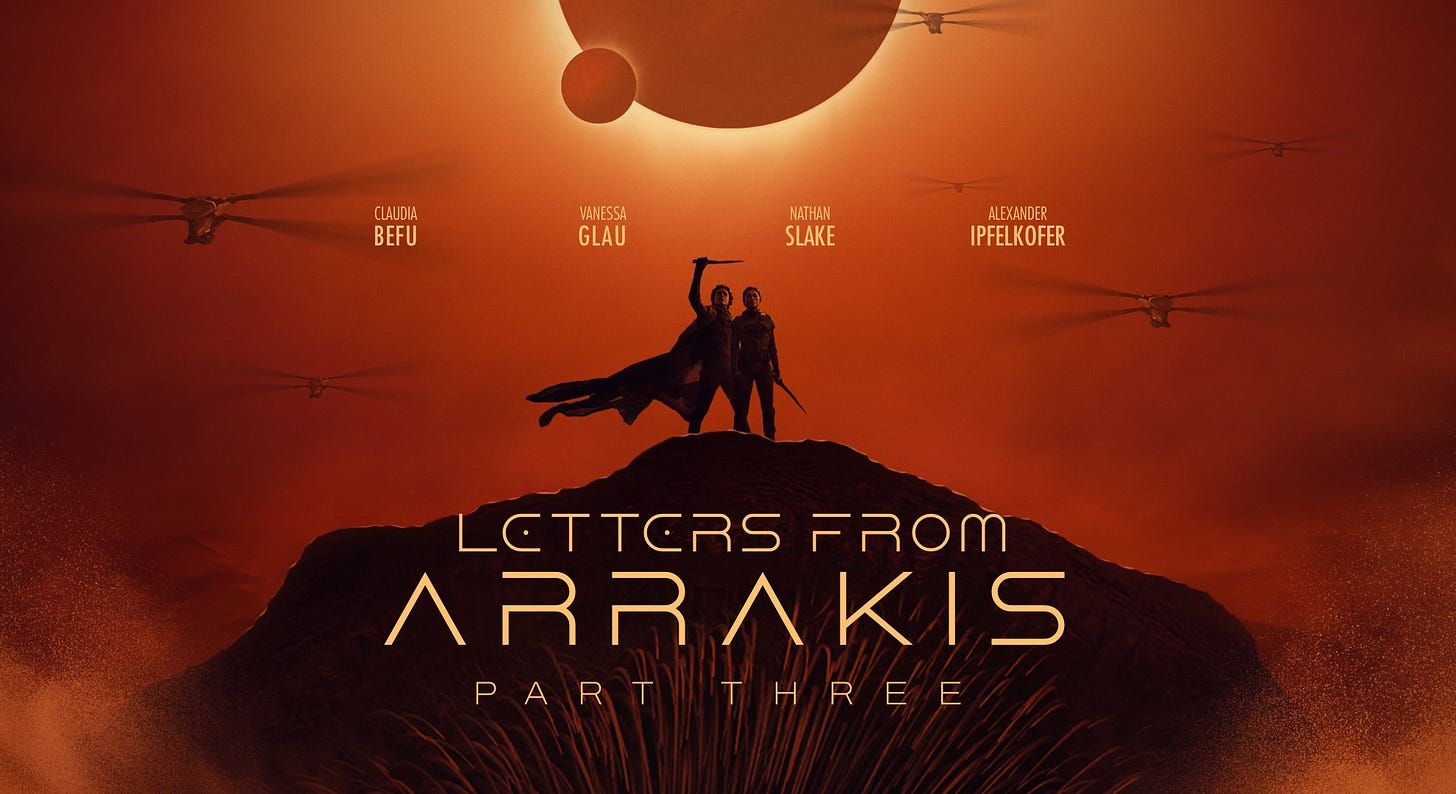
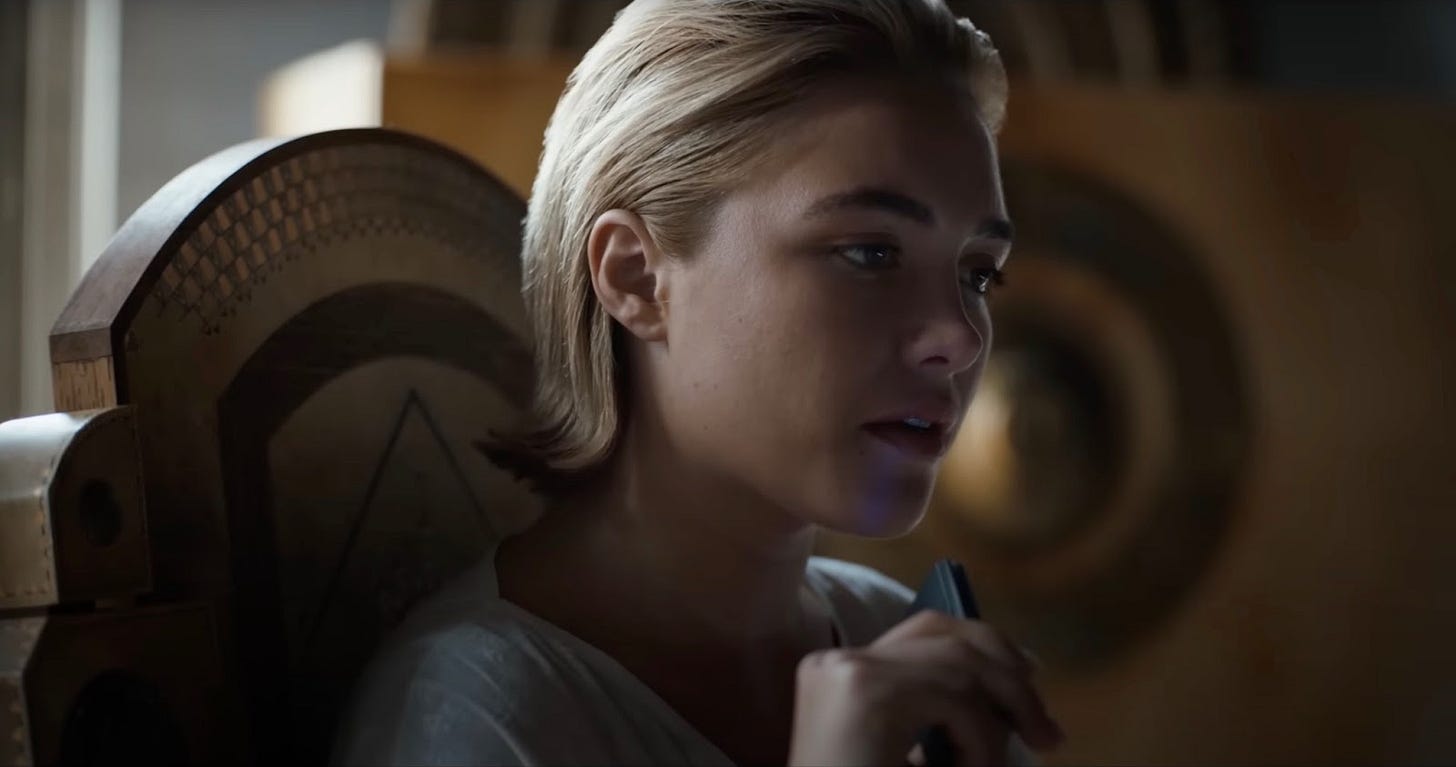
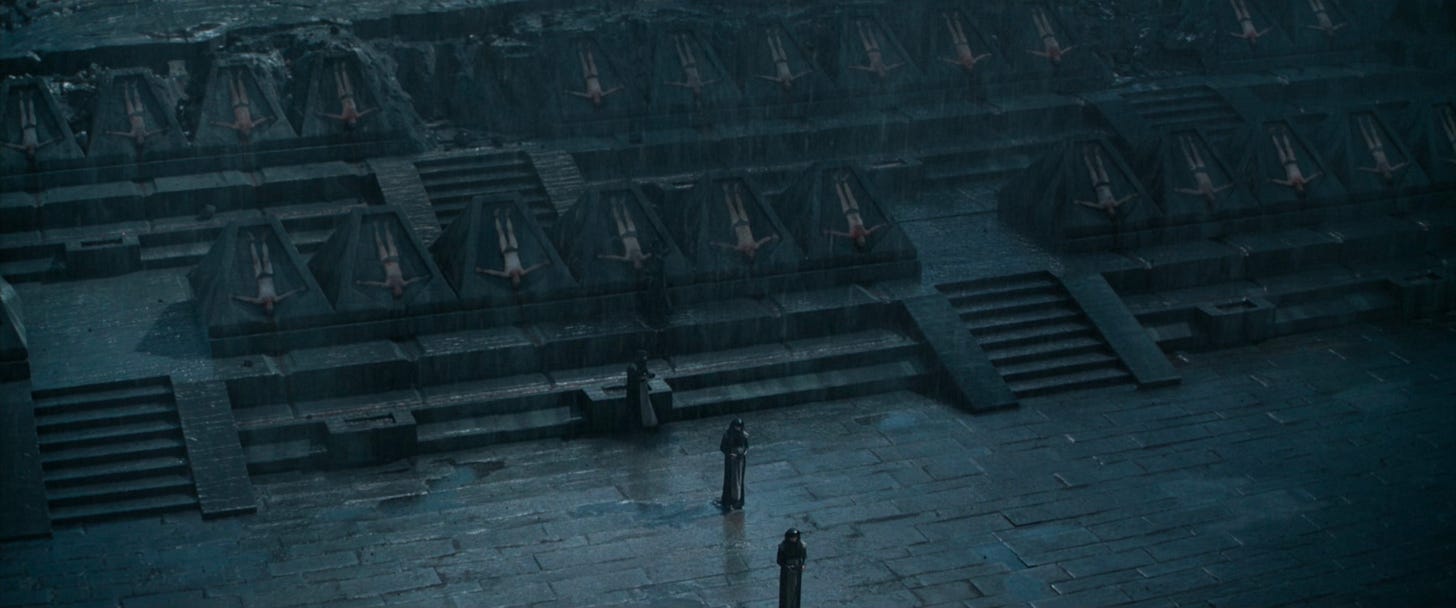
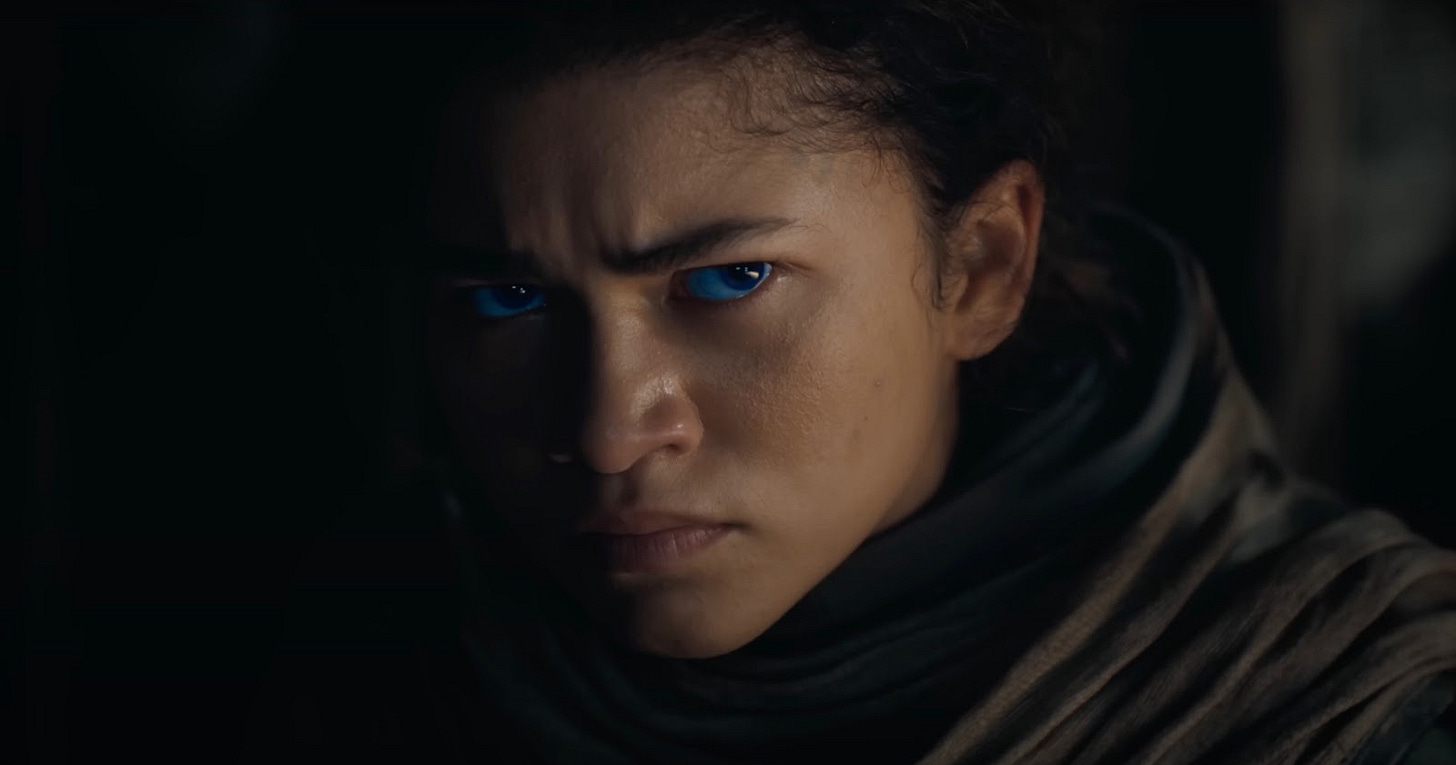
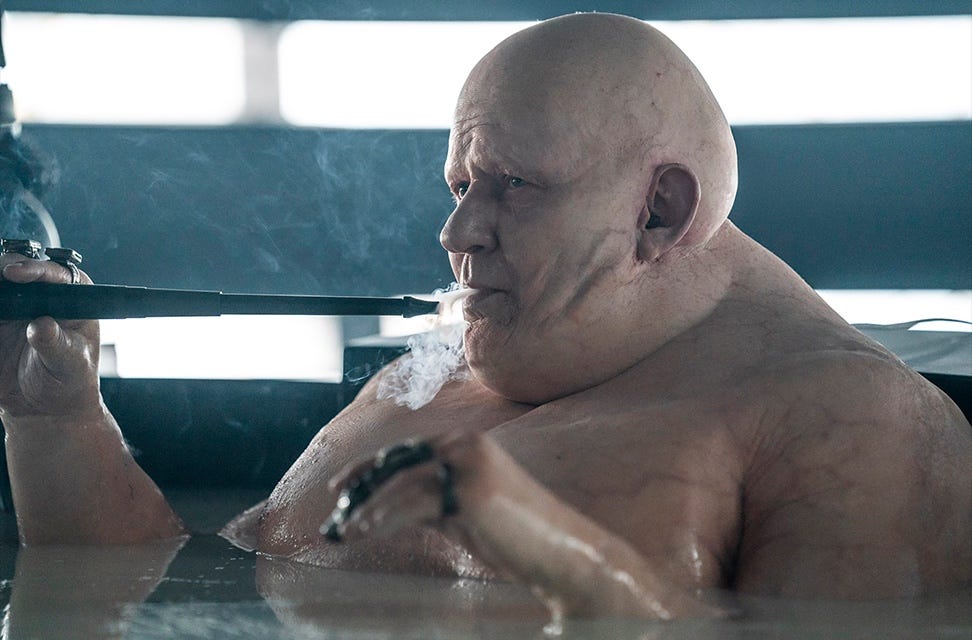




The film Dune 2 is showing in London right now, and I'm tempted to see it in an Imax cinema. Unfortunately I missed Dune 1. Do any of you folks know anything about this film? For example, is it any good, or just an excuse for special fx? If I see it, will I be at a disadvantage for not having seen Dune 1? I Have not read the books. Cheers
Dune Messiah and God Emperor of Dune are the best books. Gimme that worm-man.